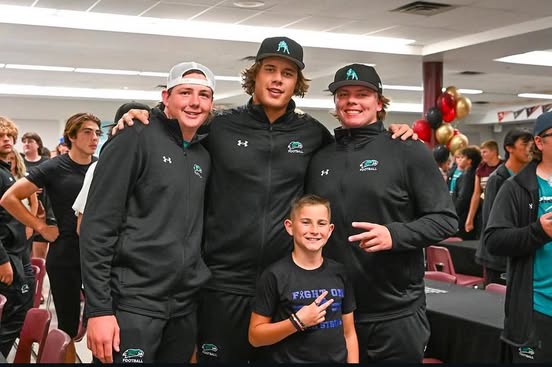Arizona high school football goes national
December 10, 2024 by Elizabeth Agazaryan, Arizona State University

Elizabeth Agazaryan is an ASU Cronkite School of Journalism student assigned to cover Valley Vista High School for AZPreps365.com
For some high school football players, traveling out of state to compete means growing their skills on the field and preparing to play football at the next level. For others, it is a chance to build a community with their teammates by creating lifelong memories that go beyond the field.
In both cases, these trips are a collective effort put together by the administrators, coaches, parents and players in order to allow for safe and exciting travels.
“It really is a once-in-a-lifetime experience,” AJ Dutchover, an offensive linemen at Southern Utah Univerity, said. “It's definitely a newer thing nowadays. Back in the day, they didn't always travel out of state to play games, and it was usually you just played the teams around you and your region.”
Dutchover, who played high school football at Highland High School in Gilbert had the opportunity to participate in two out-of-state games during high school.
During his junior year, the Hawks traveled to Las Vegas to play a bowl game against Florida high school Chaminade-Madonna. During his senior year the team traveled to Utah to play Lone Peak High School as a part of a two-year agreement.
“We set it up and we came up with a home-and-home situation,” Highland Athletic Director Brandon Larson said. “So we traveled to them year one and they traveled to us year two.”
But for schools across Arizona, balancing the excitement of playing in these games with the reality of traveling with a whole football team takes intense planning. Administrators like Larson emphasize the importance of making these games financially possible for all of the families involved.
“We try not to stack the years,” Larson said. “We try to give a year break in between. We'll start mentioning that as soon as we have parent meetings. ‘Here's where we're planning on going, here's the anticipated cost,’ so that parents have the opportunity to either save, if they need to, or to fundraise for it.”
There are many aspects that schools need to consider and plan for when allowing football teams to play out of state. Besides school administrators and football coaches, many schools have booster clubs to help raise money and plan out the trips.
“We had a seven-person board,” Basha’s booster club co-President Krissy Culmer said. “I actually have a co-president, three vice presidents, a treasurer and a secretary. Once on site, there was a handful of other parents to help serve the boys meals, make sure they took food in an orderly fashion and cleaned up afterward.”
Booster clubs across the state raise money for these trips which can cost over $45,000 depending on the number of players on the team and the distance traveled. According to Culmer, games within driving distance start at about $200 per player, while games that require flying can cost close to $1,000.
“We do snap raise, which is basically an online fundraiser,” Culmer said. “We have done concession stands, which is kind of a big one for us, during the season to raise money. We have coupon cards that we sell in August. We also look at sponsors and trying to bring in sponsorships to raise money and help the program as well.”
Some may look at all of the money teams raise and wonder why they spend it traveling across state lines. But for teams like Basha, which is looking to compete at higher levels, facing out-of-state teams allows them to show their program’s growth over the years and their future potential.
“We want to play really good teams out of state,” Basha coach Chris McDonald said. “That prepares us for good teams here in-state. And if we're able to handle business it puts us on a national page, too, which is one of my goals, too. I want my program known within the southwest part of the country.”
These games aren’t just about building a program’s reputation, they’re about challenging both players and coaches to grow, all while playing against elite football programs. Going up against nationally ranked opponents provides a clear benchmark of how a team stacks up outside its region and even Arizona.
“It's just the competitive balance,” Basha Athletic Director Eric Magana said. “We would rather play a national team that's going to give us a good test or a good matchup to kind of see where we stack up nationally. So that's kind of the reason why we're playing these games, to kind of see where we are against nationally ranked teams.”
Out-of-state games also help individual players who are looking to continue their football career after high school. It not only allows them to showcase their skills in front of different colleges, but it also provides them an opportunity to see what it is like to travel like a college team while still having classes.
“I’d say I got a little love from a couple colleges,” Dutchover said. “Definitely, some of my teammates who made some big plays in those games were getting a lot more recognition and love from schools. Making big plays under the spotlight, they were able to succeed.”
Beyond the game of football, participating in these games offers players the chance to interact with athletes from different communities and backgrounds. According to the NCAA, about 7% of high school football players move on to play at the college level. For others, playing out of state and meeting new people is a life experience they can take with them to the next part of their lives.
“You kind of just get to experience people from different backgrounds when you're playing,” Dutchover said. “Going up against different types of players teaches you a lot. I like to relate it to the fact that this journey of football is bound to end one day. When I join the workforce, I’m going to be interacting with people from different backgrounds, and I’ll need to adapt to them.”
These trips allow for new relationships to be fostered between the two school communities. Many of the schools that participate in traveling, or hosting schools from out of state, work to bring the teams together beforehand to create camaraderie that goes beyond the game of football.
“When we went up to Lone Peak they hosted a dinner for us, they fed us and did this cool presentation,” Larson said. “It was really heartfelt, and to see our kids interacting with their kids and by the end of the night, they're all intermingling, they're all talking and chatting. It is a really fun experience.”
As Arizona high school football continues to grow on the national stage, these out-of-state games have proven to be more than just opportunities to win or lose. They’re about testing limits, creating unforgettable moments and building relationships that extend beyond the game.
“Not a lot of high schools get to have that opportunity,” Culmer said. “It’s fun for them, especially if kids aren't going on to play at college. And it gives them that experience of travel that the kids that are playing in college will have to experience.”
These experiences leave a lasting mark, shaping players as athletes and people ready for the challenges ahead. For Arizona high schools, going national isn't just about football, it's about preparing for the future.


